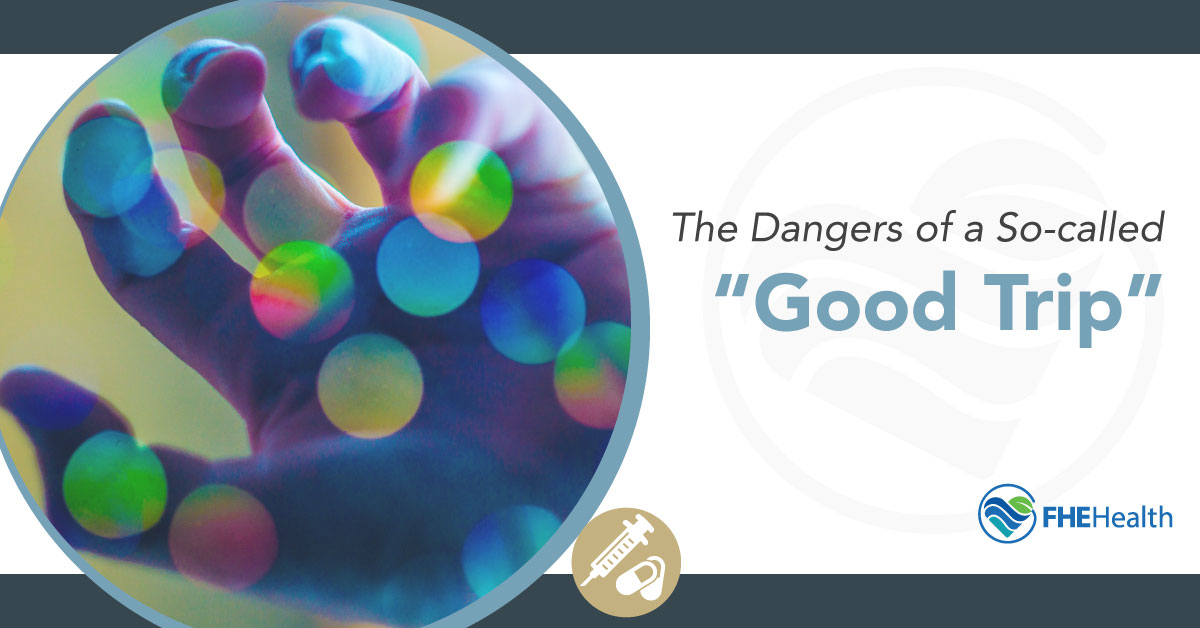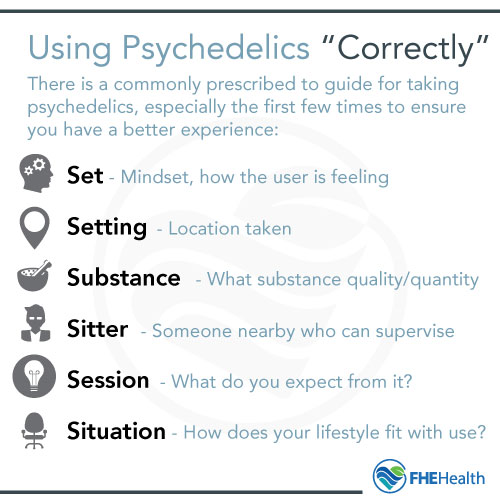
Have you ever wondered what a person means when they say they had a “good trip”? As it turns out, this may not be as abstract a concept as it seems.
In digital communities where recreational drug use is common, there are rules, guidelines and defined ways to make sure you have a “good trip” when you use a psychedelic substance like LSD or psilocybin mushrooms. But are these experience junkies distracting from the real health risks of using these substances on a habitual basis?
Despite the rules, tips and tricks, even a good trip may come with unintended side effects. In this piece, we’ll talk about why even the good side of drugs can be extremely dangerous.
Using Psychedelics Correctly
 The growth in the communication age has brought to light topics and communities that were previously considered to be underground. One of these is a widespread group of psychedelic drug users.
The growth in the communication age has brought to light topics and communities that were previously considered to be underground. One of these is a widespread group of psychedelic drug users.
In the grand scope of drug use in the United States, LSD (acid) and psilocybin (mushrooms) aren’t mentioned in the same breath as most overdose deaths, and there are very few people calling the use of these drugs an epidemic. Psychedelic drugs are usually perceived as more natural than other substances: LSD (derived from a wheat fungus), mushrooms and peyote/mescaline (mescaline is the substance contained in peyote, which is a cactus) are all found in nature. Because of this, psychedelic drugs have been used historically for Native American vision quests and similar introspective journeys by members of various cultures.
This is why “guided trips” and information about how and where to get these drugs can be found in a variety of sources all over the internet. Here’s one such guide, going over everything you need to remember for a so-called “good trip.”
Set and Setting
The terminology used in these pro-drug use communities may be something you’ve heard mentioned, but it’s unlikely that anyone outside of them is intimately familiar with the concepts.
You may have heard of “set” and “setting.” These are two of the most common words related to preparing for a psychedelic trip.
“Set” refers to the mindset a person is in when they start their trip. The guide recommends taking a few minutes to consider your goals and the outcomes you expect to gain from a session. Many people have social, physical, psychological or spiritual goals and expectations for their “journey,” as it’s sometimes called.
The other aspect you’ll hear being talked about as part of having a “good trip” is the “setting,” which needs less context to understand: The setting refers to where you’re planning on having this psychedelic experience with your hallucinogenic drug of choice. Most people recommend planning to have somewhere quiet and isolated to focus on the way the drug is making you feel. Other people think of a trip on LSD or mushrooms as more of a social experience.
The Four Other S’s
Lesser known are the four other S-words that are mentioned in conjunction with “having a good trip.” They are:
- Substance: If you take too much of a psychedelic drug, you increase your risk for a bad experience. If you take too little, you may not feel it at all, and you’ll be wasting it. The substance in question matters also. Some people may want to take more of one substance for a true out-of-body experience, while others may want to take what’s called a “microdose” for a small pick-me-up over the course of the day.
- Sitter: A “sitter” refers to a person there to supervise in case something goes wrong with your trip, or at least there to guide the user. Usually, sitters are used for inexperienced drug users, and the more veteran in these communities tend to be able to control their own experiences (or at least think they can).
- Session: The “session” part of a trip prepares the user for the rough map of their experience. Everyone experiences these types of drugs differently, and different amounts and purities can certainly change the effects, but for the most part, using psychedelics is described like climbing up and down a mountain: You’ll start to feel it more and more strongly until it plateaus at its strongest point. This is when the majority of the “trip” occurs, before coming back down to feeling normal again.
- Situation: Seasoned users of hallucinogens use their experiences to inform the way they’re living their life, and the final S-word, “situation,” refers to using what you learn during a “good trip” and integrating them with your life in a way that ideally helps you grow as a person.
The Dark Side of the Trip
 Of course, lost in all this flowery talk of growth and transcendental experiences are the dangers of these substances. While they may not be considered as dangerous as opiates, benzodiazepines and other addictive substances, they still have risks, and their use is still not permitted by law in most jurisdictions.
Of course, lost in all this flowery talk of growth and transcendental experiences are the dangers of these substances. While they may not be considered as dangerous as opiates, benzodiazepines and other addictive substances, they still have risks, and their use is still not permitted by law in most jurisdictions.
Here are some risks that talk about having a “good trip” can distract from:
A “Bad Batch”
It’s important to note that LSD and mushrooms are not safe to begin with. The people who habitually use them take on a certain level of risk. A “bad batch” of these drugs is also something to worry about. There are some high-profile cases in which people have entered a temporary or permanent case of psychosis due to not realizing exactly what they were taking.
A bad batch can mean a few things:
- It can refer to the purity: With LSD, especially, one dose isn’t very specific in terms of the amount of the drug you’re consuming. It comes in the form of small paper squares, offering little to no assurance about how much you’re actually putting into your system.
- The same applies to the actual substances contained in a single dose. Mushrooms and acid tabs can be laced with other drugs, increasing the risk of a potentially fatal overdose.
Triggering Underlying Mental Health Issues
Taking psilocybin or LSD on top of undiagnosed mental illnesses can bring those illnesses to the surface. According to Medical News Today, “magic mushrooms” aren’t always the natural wonder they’re made out to be.
Studies have found that psilocybin mushrooms can trigger psychotic episodes, especially if the user suffers from a disease like schizophrenia, either diagnosed or undiagnosed.
Decisions Made When Under the Influence
Whether you take heed of the discussion about set and setting, as well as the four other S’s of a “good trip,”, you’re still changing the way you interact with reality when you take drugs like the ones discussed here. No matter the situation, this comes with risks. Your decision-making will be changed, not to mention that, whether you have a good trip or not, you’re still committing a crime.
The fact is, when you get high on any type of substance, you’re relinquishing control of your actions, behavior and, naturally, the consequences of a given situation. While many people entered a relaxed state while using these drugs, it is possible to become a danger to themselves and others.
So, What Is a “Good Trip”?
Obviously, a good trip is one that doesn’t present danger to you or others around you, but the problem is your inability to have complete control over the situation. If you take too much of a psychedelic substance or take some from a bad batch, you won’t know until it’s too late, which is a compelling reason to stay safe and decide not to use in the first place.
For more information about the risks of abusing drugs and alcohol, contact FHE Health. If you or a loved one are struggling with addiction or a mental health disorder, contact us and learn about your options for treatment.






